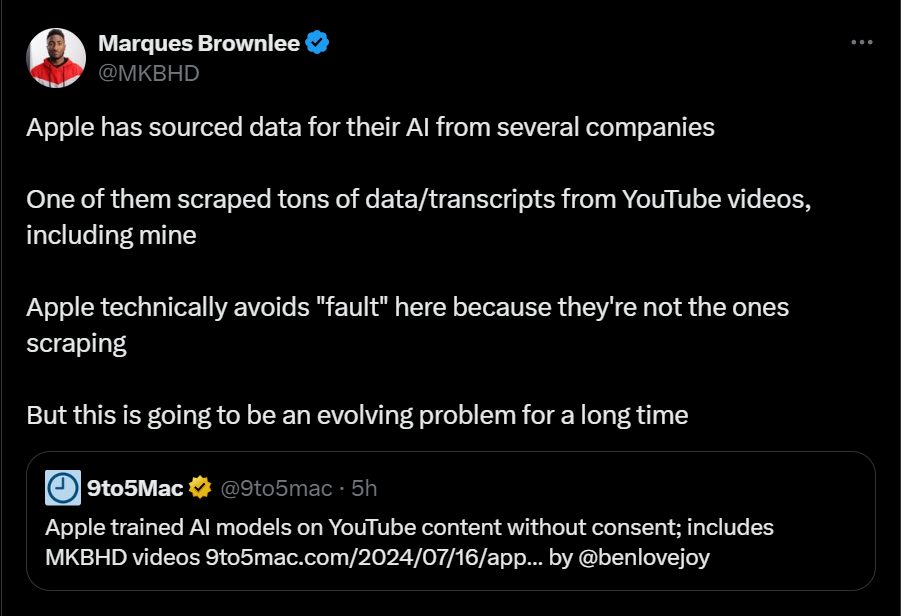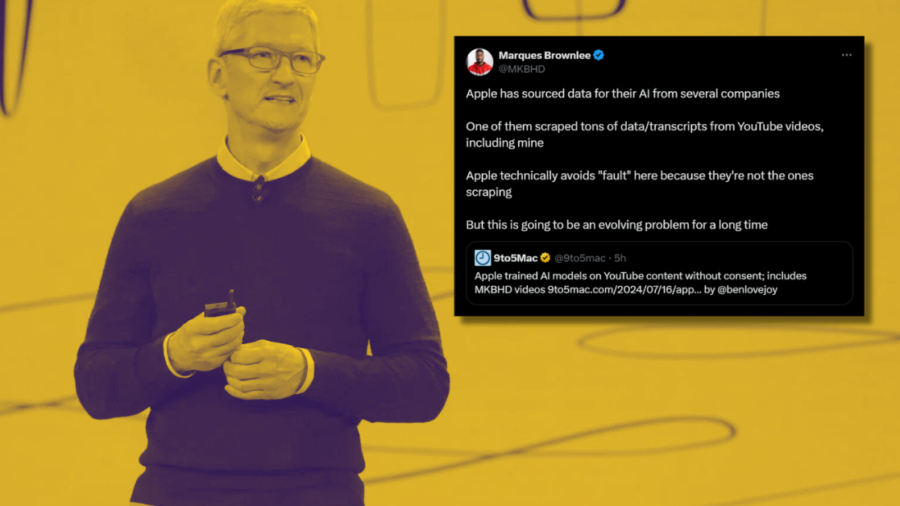In a shocking revelation, a recent investigation by Proof News has uncovered that several major tech companies, including Apple, have been exploiting YouTube video content to train their artificial intelligence (AI) models without creators’ consent. This YouTube AI data exploitation raises serious concerns about data ethics, copyright infringement, and fair use in the rapidly evolving AI development landscape.
Table of Contents
- The Scale of YouTube AI Data Exploitation
- High-Profile Creators Affected by YouTube AI Data Exploitation
- EleutherAI’s Role in YouTube AI Data Exploitation
- Legal and Ethical Implications of YouTube AI Data Exploitation
- Industry Response to YouTube AI Data Exploitation Allegations
- Broader Implications of YouTube AI Data Exploitation
- The Path Forward After YouTube AI Data Exploitation Revelations
- Conclusion
The Scale of YouTube AI Data Exploitation
The report reveals that subtitle files from an staggering 173,536 YouTube videos, spanning over 48,000 channels, were utilized by tech giants such as Anthropic, Nvidia, Apple, and Salesforce for AI training purposes. These subtitle files, essentially serving as transcripts of video content, were reportedly downloaded by a third party, circumventing YouTube’s rules against unauthorized data harvesting.
High-Profile Creators Affected by YouTube AI Data Exploitation

The list of content creators whose work was allegedly used without consent includes some of YouTube’s biggest stars and mainstream media personalities:
- Marquees Brownlee (MKBHD) – renowned tech reviewer
- MrBeast – popular content creator known for elaborate stunts and philanthropy
- PewDiePie – one of YouTube’s most subscribed individual creators
- Stephen Colbert – late-night talk show host
- John Oliver – political commentator and comedian
- Jimmy Kimmel – television host and comedian
- And many more….

EleutherAI’s Role in YouTube AI Data Exploitation
At the center of this controversy is EleutherAI, a non-profit organization that claims to assist developers in training AI models. According to the investigation, EleutherAI was responsible for downloading the subtitle files. While their stated intention was to provide training materials for small developers and academics, the dataset has found its way into the hands of major tech corporations, leading to this large-scale YouTube AI data exploitation.
Legal and Ethical Implications of YouTube AI Data Exploitation
This revelation raises a host of legal and ethical concerns:
- Copyright Infringement: The use of content without creator consent potentially violates copyright laws.
- Violation of Platform Rules: The practice goes against YouTube’s terms of service, which prohibit unauthorized data harvesting.
- Ethical Considerations: Questions arise about the ethics of using publicly available content for AI training without transparency or compensation.
- Data Privacy: Concerns about how personal information or sensitive content in videos might be used in AI training.

Industry Response to YouTube AI Data Exploitation Allegations
As of now, the tech companies implicated in this report, including Apple, have remained largely silent on the matter. Their response, or lack thereof, will be crucial in shaping the discourse around AI training practices and potentially influencing future regulations regarding YouTube AI data exploitation.
Broader Implications of YouTube AI Data Exploitation
This controversy highlights several critical issues in the AI development landscape:
- Data Sourcing Ethics: How can companies ethically obtain diverse data for AI training without resorting to YouTube AI data exploitation?
- Consent Mechanisms: Should there be standardized processes for obtaining creator consent for AI training purposes?
- Compensation Models: Is there a need for a system to compensate creators whose content is used for AI development?
- Regulatory Oversight: How can regulators effectively monitor and govern AI training practices to prevent YouTube AI data exploitation?
The Path Forward After YouTube AI Data Exploitation Revelations
As the AI industry continues to grow and evolve, it’s clear that there’s a pressing need for:
- Transparent AI Training Practices: Companies should be more open about their data sourcing methods to prevent YouTube AI data exploitation.
- Updated Regulations: Laws governing data usage and AI development may need revision to address these new challenges.
- Creator Rights Protection: Mechanisms to safeguard the interests of content creators in the AI era.
- Ethical AI Development Guidelines: Industry-wide standards for ethical AI training practices that prohibit unauthorized YouTube AI data exploitation.
For more insights on AI ethics and development practices, visit the Partnership on AI website.
Conclusion
The revelation of this YouTube AI data exploitation by major tech companies, including Apple, marks a significant moment in the ongoing dialogue about AI ethics and development practices. It underscores the complex challenges at the intersection of technology, creativity, and individual rights in the digital age.
As this story continues to unfold, it will likely catalyze important discussions about the future of AI development, content creation, and digital rights. The resolution of this YouTube AI data exploitation issue could set crucial precedents for how the tech industry approaches AI training and data usage in the years to come.
Thank you for reading the Blog, Click here to check out our other Blogs and Subscribe to our Newsletter.
